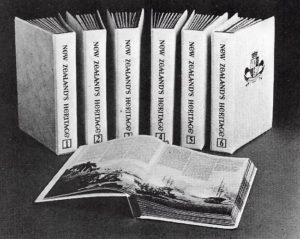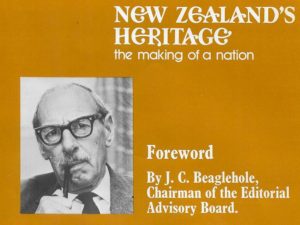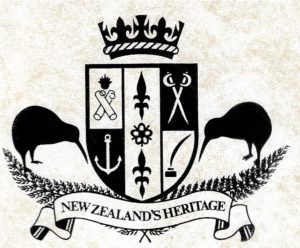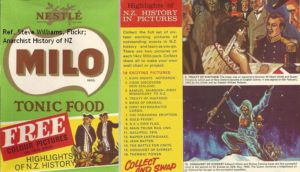1971: New Zealand’s Heritage: The Making of a Nation
October 17, 2020
By AHNZ
The zenith of a great wave lifted the population of New Zealand’s social ocean after the War and had yet to break by the end of 1973. Powerful currents of sustained economic growth, diffused prosperity, Progress, and high Social Capital nurtured a great outpouring of nation-building energy. We felt like a nation, perhaps more than ever. Our civic pride and sense of security was at an all time high and so were the will and the means to act upon it. These Kiwis were of the GI Generation and the Silent Generation, those who fought the War or grew up sharing in the experience of it and its aftermath. Their magnum opus, especially in terms of recorded history, was the 7 volume encyclopaedia set: New Zealand’s Heritage: The Making of a Nation.
Before the Boomers: High National Self-Esteem
History and heritage was so important to New Zealanders in these early 1970s that even Milo used ‘Highlights of New Zealand History‘ branding to sell their product (image right.) These were also the years that so many regional historic societies¹ flourished (perhaps even formed) and federated. I’m always impressed when visiting historical monuments at how very many of them were created or refurbished during this great zenith. Likewise, more public parks and institutions and facilities were created by groups like Lions, Rotary, and Jaycees than you could ever count and they too were especially active during this time period.
“The New Zealand History Federation Inc evolved over a number of decades, finally reaching its present format…During the weekend 20-21 March, 1971 at that inaugural meeting, the New Zealand Federation of Historical Societies (hereafter referred to as the Federation) was formed, with 44 historical societies listed as members later that year. In December 1973 the Federation was incorporated at Hamilton.”- nzhistoricalsocieties.org.nz
“In the early 1970s New Zealand Jaycee reached its zenith- its largest membership; its highest standing in its international community…its greatest boldness and success in both domestic and international projects. And then it immediately began to decline until by the early 1980s it was fighting for its life.”- p150, Butterworth and Butterworth (2007)
 It can be no accident then, that New Zealand’s Heritage: The Making of a Nation was created and consumed as popular mainstream content in the years 1971-1973. Some 3000 pages over 7 volumes, full of intelligent and researched articles with colour photos, including posters and maps and fold-out diagrams was not only possible but valued!
It can be no accident then, that New Zealand’s Heritage: The Making of a Nation was created and consumed as popular mainstream content in the years 1971-1973. Some 3000 pages over 7 volumes, full of intelligent and researched articles with colour photos, including posters and maps and fold-out diagrams was not only possible but valued!
Anti-Establishment Youth: The Rise of the Baby Boomers
The instigators of this civic pride and heritage spirit was not being generated by the new generation coming of age at this time, the Boomers. Quite the opposite! The Baby Boomers delighted in the great civic wave crashing. They despised the Establishment, rebelled against it rather than joining its ranks to keep the Jaycees or Historical Societies flourishing. For the Boomer, security comes from money and things not from family and community. Civic order and Pioneer Spirit were replaced, for them, by a new youth culture which had largely been imported from Britain and the United States.
Those who remembered muck and dirt streets and the depravities of war were relieved by the cleanness and straight lines of concrete infrastructure; To the young Boomer it was stifling concrete prison.
“I used to call the old culture the Concrete Playground. Meaning, the pub on one side and the church on the other side and nothing growing in between. A few marching teams and so on. This would be a pioneer Puritan society. It may have had its points 100 years ago but not so much now.”
“The young ones react partly because of the advance of commerce and technology. It smashes up things as well as making things. And it tends to smash up communities.”- James K Baxter interview; Where Have All the Wowsers Gone? (1972)
“…for the first time in New Zeland’s history there was the economic basis for a youth culture. The same was happening in both Europe and the United States. This international culture soon developed its own ideology and fashions of the ‘rebels without a cause,’ who liked to confront their seniors and were opposed to established values.”- p152, Butterworth and Butterworth (2007)
 Against this civic energy came a Generational Schism: The Hippies, Radio Hauraki, the youth culture, the Feminists, BLERTA, The Great Ngaruawahia Music Festival, Road Warriors, Nga Tamatoa…
Against this civic energy came a Generational Schism: The Hippies, Radio Hauraki, the youth culture, the Feminists, BLERTA, The Great Ngaruawahia Music Festival, Road Warriors, Nga Tamatoa…
The editors of New Zealand’s Heritage were old men like J Beaglehole, M Halberg, W Sutch, C Upham, K Sinclair. The presidents of the NZ History Federation in the 1970s were themselves in their 70s. Their values and their contributions were destined to be ridiculed and replaced and revised in an historic break with the continuity of New Zealand’s past since the first generation of pioneers. But, their works live on.
Where is NZ’s Heritage Now?
Many libraries still hold New Zealand’s Heritage as a complete set. It’s an invaluable resource. I stumbled upon it by finding a single issue at Browns Bay Sunday Market and only later realised there was a combined set. I guess the Editor-in-Chief, Ray Knox, wanted to get maximum value out of the collected content by re-issuing it in yet another form because along with these singles, you can often find in a second hand book shop a collection of the same that have been bound into a book title on a particular topic.
 As with Landmarks, I’m a big fan of this work and have created a page dedicated to it. It’s nearly impossible to find any reference to this great work on the internet at all but this post will change that!
As with Landmarks, I’m a big fan of this work and have created a page dedicated to it. It’s nearly impossible to find any reference to this great work on the internet at all but this post will change that!
The hard part (or am I just lazy?) is navigating the content of such a large set of books. Volume 7 has a comprehensive index to search through but then you must find out which book has the page you want to read, pick that off the shelf, find the page, scan the text. If it’s not quite what you wanted then you need to go through it all again until you’ve got several heavy books open or bookmarked; The old fashioned version of having tabs open on your web browser!
My solution for my own use, and yours if you like, is to digitise the entire index and make it searchable. You’re still going to need a copy of the books so you can read the article. However, the Anarchist History of New Zealand search box will tell you in less than a second if your topic is in the books and which volumes and which pages to open so you can read about it. This is a work in progress right now (Oct 2020) but already quite handy. If you see any mistakes please let me know so I can fix them.
—
1 Ref New Zealand History Foundation Inc. membership list
Image ref. Coat of Arms for NZ’s Heritage binders
Image ref. Nestle Milo Highlights Of NZ History, 1975; Steve Williams, Flickr
Ref. 10mins; Survey – Where Have All the Wowsers Gone? (1972); NZ On Screen
Ref. Historical Societies of today that are part of the NZ History Federation; Ref. NZHF
Ref. Jaycee- Developers of People, Builders of communities; Butterworth and Butterworth (2007)
8 thoughts on "1971: New Zealand’s Heritage: The Making of a Nation"
Leave a Reply
 Like Comment Share
Like Comment Share








I remember Sue Bradford’s Progressive Youth Movement [must be photo in the Press]. They held a march chanting “take a walk. Come on down and see the pigs that run our town”. The real story though can be found in various accounts of infiltration of institutions. Many people now have status enhancing luxury beliefs (eg) forever immigration. Most importantly though it is selective media coverage. Eg. We often hear politicians, Hosking or Spoonley relate why we can’t do without “needed skills”. That’s a half truth because (Michael Reddell points out) what makes perfect sense at the firm level doesn’t necessarily translate to the macro level (eg) each new job in tourism makes us poorer as a nation, requires infrastructure and the benefits flow to land owners. Real wages have been falling in tourism and hospitality.
Just wondering if these sets of NZ Heritage are of any value? I have a complete set of all 7 volumes in excellent condition and was wondering if there is any market for them?
It’s priceless treasure but financially, I think not. Picked mine up for little or nothing. I’m afraid people don’t want read and think about sources they want the One Truth and so anything “old” cannot be that can it?
I also have a full set. My grandchildren and great grandchildren do not want them.
If they are not worth anything financially where should they go?
They are heavy and taking up space. I would like to sell but it seems there is no value. They must be of value to someone!
Appreciate your time. Thank you.
Thanks for asking. For sale in Tirau for $95.00 but they’re having a laugh. My thinking is that a serious history student would love to consult them. Until they come along hold on.
If you want to pass them onto someone who woukd appreciate them. Then let me know.
I have the full set of 7 as well as the index. Handed down by my grandma
Well, if you’re like me you’ll appreciate the index search box above. I’ve got an improved version actually that tells you which volume as well as the page number. Just haven’t updated this online one with it. Should I?